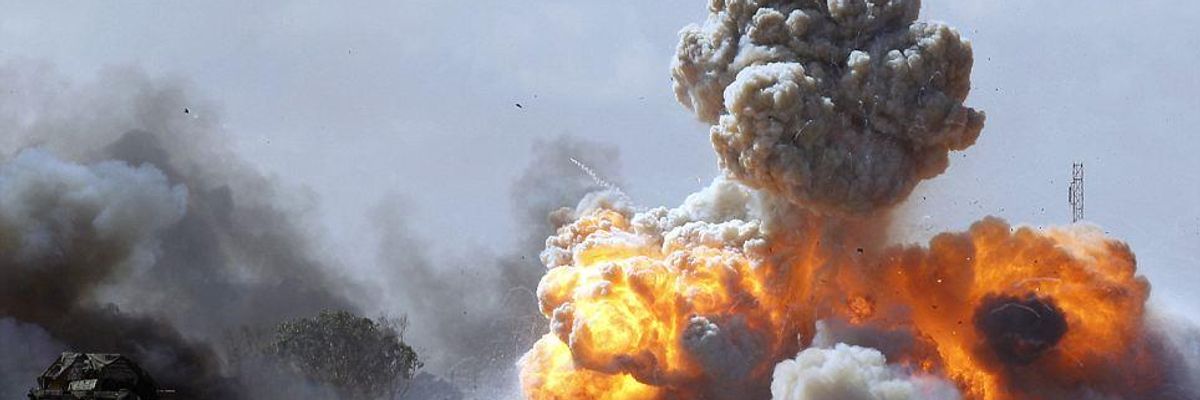Five years ago, on March 17, 2011, the United Nations Security Council adopted Resolution 1973 (2011) authorizing "regional organizations or arrangements...to take all necessary measures...to protect civilians and civilian populated areas under threat of attack" in Libya. The resolution was adopted with ten votes for, none against, and five abstentions.
In explaining the reason for its abstention, India implicitly questioned the narrative propagated by the U.S., France, and the UK, which depicted Qaddafi as bordering on genocidal. India noted that Resolution 1973 authorized "far-reaching measures under Chapter VII of the United Nations Charter, with relatively little credible information on the situation on the ground in Libya."
India was right to question the credibility of the narrative that was employed to ensure the adoption of Resolution 1973. For starters, the protests were not as peaceful as the pro-intervention narrative suggests. Some protesters in Libya had taken up arms from the first day of the uprising on February 15, 2011, and many more began using violent means soon after. Further, based on the events prior to the adoption of Resolution 1973, there was no indication that Qaddafi's threats were aimed at anyone other than those who took up arms against his regime.
On April 14, 2011, Alan Kuperman asked whether President Obama had used a false pretense for war in Libya, noting that after nearly two months of fighting in Misrata, a city of 400,000 people, 257 people had been killed, including combatants. Of the 949 who had been wounded, 22--less than three percent--were women. Clearly, these statistics do not support the accusations that Qaddafi's forces were indiscriminately attacking cities and cutting down anyone who stood in opposition to his regime.
According to Kuperman, Qaddafi's "acts were a far cry from Rwanda, Darfur, Congo, Bosnia, and other killing fields. Libya's air force, prior to imposition of a UN-authorized no-fly zone, targeted rebel positions, not civilian concentrations. Despite ubiquitous cellphones equipped with cameras and video, there is no graphic evidence of deliberate massacre. Images abound of victims killed or wounded in crossfire -- each one a tragedy -- but that is urban warfare, not genocide." Even before Kuperman's assessment of the justification for intervention in Libya, David Kirkpatrick reported in The New York Times on March 21, 2011 that "the rebels feel no loyalty to the truth in shaping their propaganda...making vastly inflated claims of his [Qaddafi's] barbaric behavior."
All of this is consistent with what the Obama administration knew, which we now also know, thanks to the release of former Secretary of State Hillary Clinton's emails. As Dan Kovalik recently detailed, a March 30, 2011 email from Sidney Blumenthal to Secretary Clinton stated that the "humanitarian motive offered is limited, conditional and refers to a specific past situation." "In other words," wrote Kovalik, "while NATO would go on bombing for another 7 months, Blumenthal is already admitting that there is really no humanitarian basis for continuing the conflict."
This information was never written into the official narrative, because it was important for the U.S. and NATO that their war of aggression retained its "humanitarian" character. Of course, there was nothing humanitarian about the intervention. If the U.S. and NATO were truly concerned with the security of Libya's citizens, rather than launching 14,202 strike sorties by the middle of May 2011, they would have supported the creation of a humanitarian corridor. As Vijay Prashad noted, "The real humanitarian intervention there would have been to have conducted the creation of a corridor, a momentary ceasefire, let people leave as war refugees, and then see what happens, because this is not strictly the case in Benghazi of unarmed civilians fighting against a state."
Instead, the U.S. and NATO repeatedly stood in the way of proposed ceasefires. Prior to the initiation of the "humanitarian" bombing campaign, Qaddafi proposed a ceasefire between his forces and the rebels, which was rejected. A second ceasefire offer, developed by the main regional stakeholder, the African Union, and supported by Qaddafi was rejected on April 10. The AU proposal called for a ceasefire, the creation of corridors for the delivery of humanitarian aid, and a dialogue to open discussions on reforming Libya's political system. A similar proposal was again rejected on April 29.
Clearly, the protection of life was not chief among U.S. and NATO's concerns. This is made even clearer by the U.S. and NATO's continuous military support for the rebels even as they committed war crimes. In its March 2012 report, the International Commission of Inquiry on Libya found that the rebels committed "acts of extrajudicial executions of those perceived to be loyalists, suspected mercenaries and captured Qadhafi soldiers, particularly when towns first came under control of thuwar (anti-Qaddafi forces)." Again, thanks to the release of Clinton's emails, we know that the Obama administration was aware that the rebels were committing crimes by as early as ten days into the bombing campaign. In a March 27, 2011 email from Blumenthal, Clinton was informed that "one rebel commander stated that his troops continue to summarily execute all foreign mercenaries in the fighting."
The U.S. and NATO perpetrated a war of aggression against Libya under knowingly false "humanitarian" pretenses. Further, while conducting their war of aggression, they materially supported the armed opposition with the knowledge that the rebels were committing war crimes. That adds complicity in the rebels' crimes to their "humanitarian" record. As if that were not enough, the U.S. and NATO, by virtue of the above, are responsible for the widespread lawlessness that consumed Libya subsequent to the intervention and that continues today.
Don't expect any repercussions, though. As has been demonstrated time and time again, the actions of the U.S. and its allies occur in an accountability vacuum that is central to the prevailing culture of impunity within which the U.S. acts. Some even hailed the intervention as a success and others still do.
